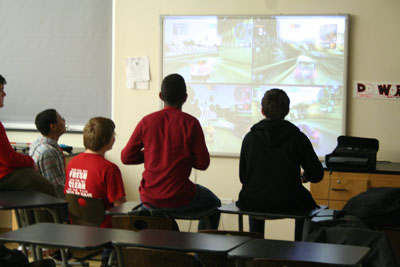Call of Duty flickers across several screens, casting a soft blue glow upon Julie Sutfin’s darkened classroom. Fifteen students are plopped on the floor as their thumbs skitter across wireless controllers. Others watch the action unfold, patiently awaiting the moment when the loser gives up his spot.
Every Thursday after school, members of the Sony Gamers’ Club swarm to Sutfin’s classroom with armfuls of video games, chargers and game consoles. Once the Playstation 3 is warm, club members enjoy an hour of social game-play.
“This is a complete getaway from real life and the stresses of school,” Sutfin, science teacher and club sponsor, said. “The kids just love it, and it’s so fun to see people so happy at school.”
According to a report by the Entertainment Software Association, video games have grown in popularity to the point where 68 percent of American households have members who play them.
“There is something to be said for the way video games are structured that allows people to take risks and fail,” Carrie Medelman, psychology teacher, said. “There are few things in life like that. If you fail at Kirkwood, it’s an F, but video games don’t work that way. In the game you figure things out because you are allowed to fail, and people who play them look into their lives for that hook.”
The rise in popularity does not mean more people are glued to their couches, unable to resist Call of Duty. Studies conducted by the University of Rochester found that high-action video games can also leave players with a heightened sense of visual perception.
When researchers administered a visual test, video gamers could identify 30 percent more of the moving objects on the screen than those who did not play high-action video games. Researchers believe this may be due to a magnified sense of danger many players experience during game play, which could increase awareness and quicken a player’s ability to visually process an event.
Another study done by the University of Rochester suggests people who play action-packed video games are better at making quick decisions. The researchers placed dozens of 18-25 year-olds who did not regularly play video games into two groups. One group played 50 hours of Call of Duty, while the other played 50 hours of Sims, a slower-paced game.
After the 50 hours ticked away, each subject was asked to make a quick decision in several tasks designed by the researchers. In the end, researchers discovered the people who played Call of Duty were almost 25 percent faster at coming to a conclusion about the action on the screen. They even answered the same amount of questions correctly as their Sims-playing peers.
“Once gaming became national, it changed the way our attention was impacted,” Medelman said. “Gaming and the media, in general, have made our attention spans different because we are used to toggling back and forth between screens, so we are better able to focus on more things at once.”
Excessive game play does have negative effects, too. A study published in the journal Pediatrics followed 3,000 students in the third, fourth, seventh and eighth grades in Singapore.
The study found children who were less comfortable with other children spent more time playing video games. Two years later, these heavy gamers, who played an average of 31 hours a week compared with 19 hours a week for other students, were more likely to suffer from social phobias.
“It’s the type of person going into the game that really matters,” Medelman said. “If you’re already shy, than sitting in a room playing video games isn’t the best thing to do. But if you’re outgoing, you can probably get away with playing more often. Moderation is good in everything and that’s no different with video games.”
Even though Nathan Kraus, junior and president of Sony Gamers’ Club, resides over a group centered around video games, he believes the organization offers an essential social element to gaming.
“Video games can only get you so far entertainment-wise,” Kraus said. “You need reality and you need to come back to the world once in awhile. A video game is just a game, and it always will be.”









